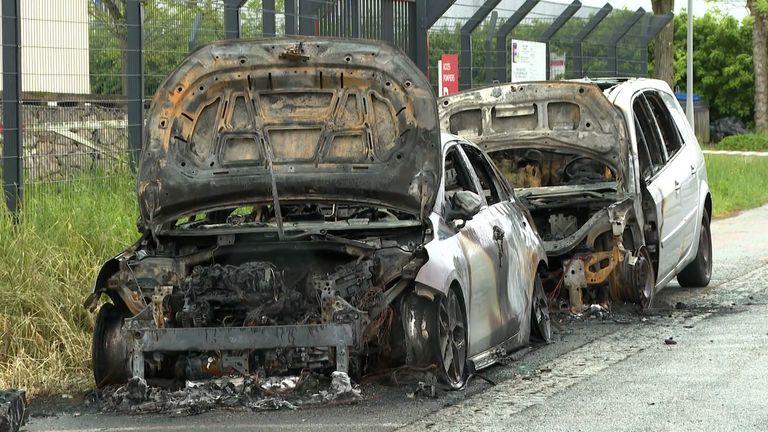Anti-Terror Probe Launched After Wave of Attacks on French Prisons
In a significant escalation of security concerns, French authorities have initiated an anti-terror investigation following a series of violent incidents targeting the nation’s prison institutions. The attacks, which have raised alarms about the potential radicalization of inmates and the growing influence of extremist ideologies within the prison system, have prompted urgent calls for enhanced protective measures and a reassessment of current policies. As France grapples with the implications of these incidents, the government faces mounting pressure to ensure the safety of both staff and inmates while addressing the underlying threats posed by radical elements. This article delves into the recent attacks, the government’s response, and the broader implications for France’s approach to prison safety and counter-terrorism efforts.
Investigating the Surge in Prison Violence: A Comprehensive Review
The spike in violence within French prisons has prompted serious concerns regarding safety and security in the correctional system. Authorities are now facing mounting pressure to address these incidents, which have raised alarm bells not only for prison staff but also for inmates and the surrounding communities. According to sources, the most recent attacks have been characterized by targeted assaults, including gang-related violence and clashes between rival factions. This troubling trend highlights the need for immediate interventions and an exhaustive investigation into the underlying causes of such hostilities.
In light of the recent events, an anti-terror probe has been initiated, focusing on the potential links between organized crime and extremist elements within the prison system. Key factors contributing to this violence include:
- Overcrowding: Prisons operating beyond capacity can exacerbate tensions.
- Lack of Rehabilitation Programs: Limited access to effective rehabilitation initiatives can lead to a cycle of violence.
- Gang Influence: The growing power of gangs within prisons complicates inmate relations.
- Inadequate Staffing: Insufficient personnel can hinder the ability to manage conflicts.
Authorities have begun working collaboratively with various organizations to implement a robust framework aimed at curbing violence and ensuring the safety of all individuals within correctional facilities. The following table outlines recent incidents and the responses initiated:
| Date | Incident Description | Response |
|---|---|---|
| 2023-09-15 | Altercation between rival gangs | Increased security personnel deployed |
| 2023-09-20 | Physical assault on staff member | Investigation launched, staff protection measures enhanced |
| 2023-09-25 | Riots reported in multiple locations | Lockdown procedures implemented, crisis management teams activated |
Understanding the Motivations Behind Attacks on French Prisons
The recent spate of attacks on French prisons has triggered a comprehensive anti-terror investigation, shedding light on the complex motivations behind these violent incidents. Analysts indicate that these assaults are not merely random acts of violence; rather, they stem from a confluence of ideological, political, and social factors. A significant motivation appears to be the desire to retaliate against the state for perceived injustices, particularly among marginalized communities. Additionally, the rise of radicalization among inmates who adopt extremist views has further fueled tensions within prison walls.
Moreover, the strategic targeting of prisons can be seen as a move to amplify the narrative of resistance against governmental authority. Many attackers view these institutions as symbolic of state oppression and control. Key drivers behind these attacks include:
- Radical Ideology: The belief in fighting against the “oppressive” state.
- Visibility: Using horrific acts to gain media attention and inspire followers.
- Prison Conditions: Months of unrest related to overcrowding and inadequate facilities have fueled discontent.
| Motivations | Examples of Actions |
|---|---|
| Ideological Resistance | Attacks on guards and infrastructure |
| Social Unrest | Riots and escape attempts |
| Revenge | Coordinated assaults on specific facilities |
Legal and Security Implications of the Anti-Terror Probe
The launch of an anti-terror probe in response to recent attacks on French prisons raises significant legal implications that merit careful examination. Authorities must navigate the delicate balance between ensuring national security and upholding civil liberties. Among the key legal considerations are:
- Judicial Oversight: The importance of maintaining judicial oversight in the investigation process to protect against potential abuses of power.
- Privacy Rights: The challenges in conducting surveillance operations while respecting individual privacy rights as dictated by national and international laws.
- Proportionality: Ensuring that counterterrorism measures are proportionate to the threats faced, preventing overreach that could infringe on fundamental freedoms.
On the security front, the probe underscores a proactive approach to combatting terrorism within correctional facilities. Key security implications include:
- Increased Resource Allocation: A potential need for enhanced funding and resources to strengthen security protocols in prisons.
- Collaboration with Intelligence Communities: Enhanced collaboration between various intelligence agencies and law enforcement to share critical information.
- Training for Prison Staff: Implementation of specialized training programs for prison staff to better identify and mitigate potential threats.
| Aspect | Importance |
|---|---|
| Judicial Oversight | Prevents abuse of authority |
| Privacy Rights | Maintains individual freedoms |
| Resource Allocation | Strengthens prison security |
Recommended Strategies for Enhancing Prison Safety and Security
In light of recent incidents, enhancing safety and security within prison facilities is imperative. Stakeholders must prioritize the implementation of systematic strategies aimed at preventing violence and maintaining order. Some effective measures include:
- Improved Surveillance: Upgrading camera systems and monitoring equipment to ensure real-time oversight of inmate activities.
- Enhanced Training: Providing staff with advanced training in conflict resolution and crisis management to better handle volatile situations.
- Intelligence Sharing: Establishing networks for information exchange between prisons and law enforcement agencies to identify potential threats.
- Visitor Controls: Increasing scrutiny during visitor sessions through background checks and restricted access to sensitive areas.
Moreover, promoting a rehabilitative environment can play a vital role in enhancing security. By addressing inmates’ psychological needs and providing educational programs, facilities can foster a more peaceful atmosphere. Key elements to consider include:
- Access to Counseling: Ensuring inmates have access to mental health professionals to deal with underlying issues.
- Skill Development Programs: Offering vocational training to prepare inmates for reintegration into society, reducing recidivism rates.
- Positive Reinforcement: Implementing incentive programs that reward good behavior to encourage compliance and respect for rules.
In Retrospect
In conclusion, the recent series of attacks on French prisons has prompted a significant response from authorities, with an anti-terror probe now underway to address the rising concerns over security and inmate radicalization. As investigators sift through the details of these incidents, the implications for France’s penal system and broader societal stability remain profound. The government’s commitment to enhancing security measures within correctional facilities will be closely scrutinized in the coming weeks, as the nation navigates the complex intersections of justice, safety, and civil liberties. The growing threat of extremist violence in such environments underscores the urgent need for comprehensive strategies to combat radical ideologies and protect both prison staff and the general public. As this situation continues to develop, all eyes will be on France as it seeks to ensure the safety of its institutions in an increasingly volatile landscape.




